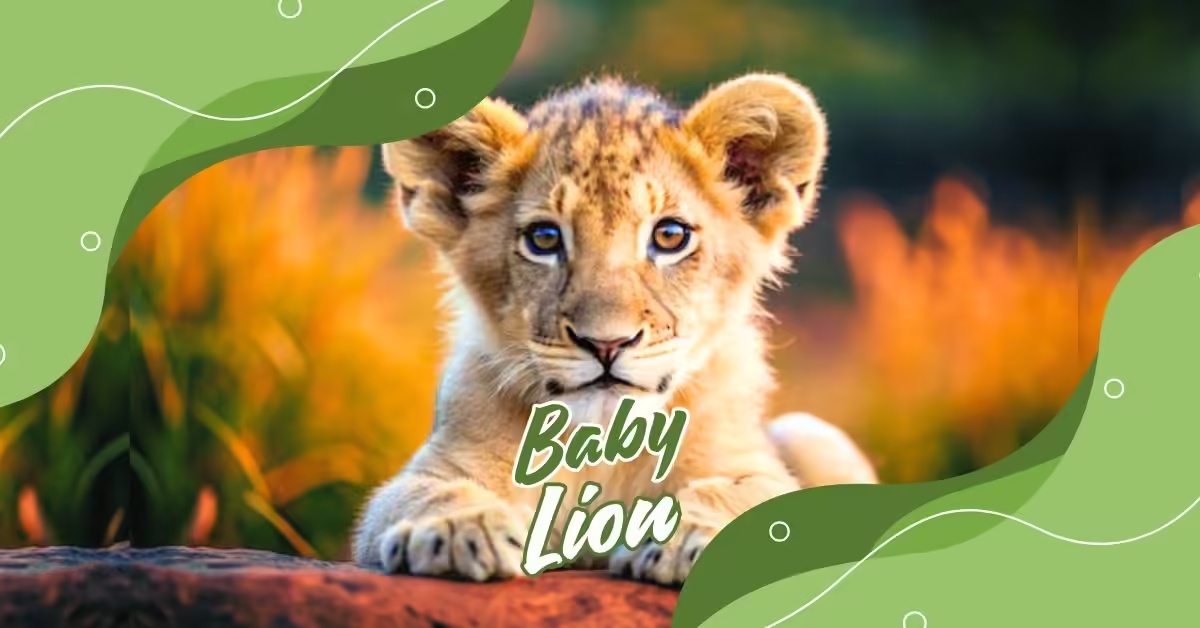The early life of a lion, often referred to as a baby lion or cub, is full of fascinating developments that set the stage for them to become the “King of the Jungle.” From their birth to their first hunt, these small but mighty creatures undergo numerous changes that are crucial to their survival in the wild. In this blog, we’ll explore some incredible facts about baby lions, their behaviors, growth, and survival strategies.
What Is a Baby Lion Called? Understanding Lion Cubs
A baby lion is called a cub. These adorable creatures are born into lion prides, which are typically made up of a few adult males, several females, and their offspring. At birth, lion cubs are incredibly vulnerable. Weighing about 2-4 pounds, they are born blind and rely entirely on their mother for protection and nourishment. The term “cub” is used not just for lions but also for other big cats like tigers and leopards, but the baby lion has some unique traits that distinguish it from the others.
What Do Baby Lions Eat?
In the initial stages of life, a baby lion solely depends on its mother’s milk for survival. This stage usually lasts for the first 6-8 weeks, after which lion cubs are gradually introduced to meat. Around this time, they begin to follow their mother to the pride’s kills. What do baby lions eat? Their diet transitions from milk to raw meat as they grow, which is essential for their development. The adult lions in the pride help provide this food by hunting large prey like zebras, antelopes, and buffalo.
It’s fascinating to note that lion cubs don’t directly compete with adults for food at first. Adult lions often allow the cubs to eat after them, teaching them patience and group hierarchy.
How Baby Lions Learn to Hunt: Instincts and Lessons
Hunting is a vital skill for every baby lion as it grows into adulthood. Though the instinct to hunt is present, cubs have to learn the actual skills from their mothers and the other members of the pride. The learning process starts when they are around 3 months old. They watch their mothers hunt and playfully stalk other cubs in the pride to practice their hunting techniques. This playful behavior is essential for developing coordination and muscle strength.
By the time they are 1-2 years old, they start to participate in real hunts. Learning how to hunt is a gradual process, and even when they are 2 years old, they aren’t yet as skilled as the adults. It takes time for a baby lion to master the precision and strength needed to bring down large prey.
Baby Lion Behavior: Play, Learning, and Socializing
One of the most fascinating aspects of baby lion behavior is how much time they spend playing with each other. Play is essential for their mental and physical development. Lion cubs play by pouncing, biting, and tackling each other. These behaviors help them develop the skills they need for hunting and defending themselves later in life.
Additionally, cubs are highly social animals and depend on the pride for survival. The bonds they form with their mothers, siblings, and other pride members are critical. They communicate through different sounds, such as meows, growls, and roars, which help them express emotions and alert the pride to danger.
Growth Stages of a Baby Lion: From Cub to King of the Jungle
The growth stages of a baby lion are marked by rapid physical and behavioral changes. Below is a breakdown of the key milestones:
- 0-2 months: Newborn lion cubs are blind at birth and completely dependent on their mothers. They stay hidden from predators and other pride members to ensure their survival.
- 2-4 months: Cubs begin to follow their mothers around and are introduced to the pride. They start eating meat alongside milk.
- 6 months: By this age, cubs are quite mobile and start play-fighting with their siblings to improve their hunting skills.
- 1-2 years: Cubs begin to take part in group hunts but still rely on their mother and the pride for most of their food.
- 2-3 years: Male cubs start becoming independent and are often pushed out of the pride by dominant males to prevent competition. Female cubs, on the other hand, may remain in the pride.
- 3+ years: The lion cubs are now considered young adults and have fully developed hunting and social skills.
How Lion Prides Protect Their Baby Lions
Lions raise their cubs in a highly structured social environment. The pride plays a crucial role in ensuring the safety and well-being of all cubs. Female lions, especially, are very protective of their young. They will keep their cubs hidden from threats like hyenas and leopards for the first few weeks of life.
Male lions also play a protective role, guarding the pride from other lions or potential intruders. When new males take over a pride, they often kill the existing cubs to ensure that their offspring dominate the pride’s future.
A lioness usually gives birth to multiple cubs, which means the cubs have siblings to grow up with. The social bond within the pride helps the cubs survive because it takes a collective effort to protect and feed them.
Challenges Baby Lions Face in the Wild
Despite the efforts of the pride, baby lions face several challenges. Predators such as hyenas, leopards, and even other male lions pose a significant threat to cubs. It’s estimated that around 80% of lion cubs do not survive their first two years. In addition to predators, disease and starvation are major risks.
Environmental changes, such as habitat loss and droughts, also make survival more difficult. When food becomes scarce, adult lions often prioritize feeding themselves, leaving the cubs more vulnerable.
The Importance of Play in Baby Lions’ Development
Play is not just a fun pastime for lion cubs; it is crucial for their development and survival skills. Engaging in play helps cubs develop their physical strength, coordination, and social bonds with their siblings and other pride members. During these playful antics, cubs learn essential skills such as pouncing, chasing, and fighting—all vital for their future roles as hunters and protectors of their pride.
One fascinating aspect of their play is that it mimics real-life hunting scenarios. For example, cubs will often sneak up on each other, practicing their stalking techniques, which prepares them for when they need to hunt live prey. This playful behavior is not only entertaining to watch but is also fundamental in teaching them the skills they need to thrive as adults.
The Role of Female Lions in Raising Cubs
The lioness plays a pivotal role in the upbringing of cubs, showcasing a remarkable example of maternal instinct. After giving birth, a lioness will typically find a secluded spot to keep her cubs safe from predators. During the early weeks, she keeps the cubs hidden, ensuring their safety while she hunts for food.
Once the cubs are old enough, she introduces them to the rest of the pride. Lionesses often take turns caring for the cubs, allowing them to socialize and build relationships with their peers. This cooperative rearing strategy ensures that the cubs receive the attention and care they need, increasing their chances of survival in the wild.
The Threat of Human Activity on Lion Cubs
While nature poses many challenges for baby lions, human activity has significantly impacted their survival rates. Habitat loss due to agriculture, urbanization, and poaching puts immense pressure on lion populations. As their natural habitats shrink, the availability of prey decreases, leading to starvation and vulnerability.
Conservation efforts are critical to ensuring the survival of lion cubs and their families. Organizations work tirelessly to protect their habitats, monitor lion populations, and promote coexistence between lions and local communities. Awareness campaigns help educate people about the importance of preserving these majestic animals and their ecosystems.
For more tips and guides, visit our homepage at My Read Magazine and explore a world of helpful content!
FAQs About Baby Lions: Everything You Need to Know
1. How long do baby lions stay with their mother?
Cubs usually stay with their mothers for up to two years before becoming independent.
2. How much does a baby lion weigh at birth?
A baby lion typically weighs between 2-4 pounds at birth.
3. When do baby lions start eating meat?
Lion cubs begin to eat meat at around 6-8 weeks of age.
4. How many cubs are born at once?
A lioness can give birth to 2-4 cubs in a single litter.
5. How do lions protect their cubs from predators?
Lions hide their cubs for the first few weeks and the pride collectively protects them from threats.
6. Do male lions help raise the cubs?
Male lions mainly focus on protecting the pride and don’t play a direct role in raising the cubs.
7. What sounds do baby lions make?
Baby lions communicate through meows, growls, and eventually learn to roar.
8. Why do lion cubs play so much?
Play is a critical part of learning hunting and fighting skills that will be essential for survival.
9. How long before a baby lion becomes a full-grown adult?
A lion is considered an adult at about 3 years old, though males may take longer to become fully mature.
10. Do lions ever abandon their cubs?
If food is scarce, lionesses may abandon weaker cubs to ensure the survival of the stronger ones.
Conclusion
The life of a baby lion is full of both challenges and adventures. From being vulnerable newborns to growing into skilled hunters, lion cubs undergo a significant transformation that prepares them for their role in the pride. Despite the dangers they face, the baby lion’s survival is a testament to the strength and organization of the lion pride.




